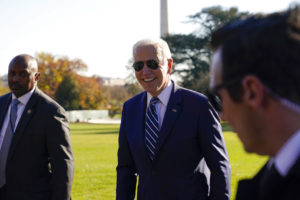Photo courtesy of Politico
On April 6, the conservative majority of the Supreme Court decided to block a District Court order which extended the deadline to cast absentee ballots in Wisconsin’s primary election. A day later, Wisconsin Assembly Speaker Robin Vos assured voters that it was “incredibly safe to go out” while he was wearing a mask, gloves, and other protective gear. Milwaukee’s 180 polling stations were reduced to only five, and voters stood in long lines for hours to cast their votes, despite the state’s stay-at-home order which has been in effect since March 25.
In their decision, the majority opinion clarified that they were not disputing the merits of absentee voting or the extension of the deadline to April 13 for absentee ballots to be received. Instead, the issue at hand was what they considered “a narrow, technical question:” whether ballots must be mailed by election day, April 7. Based on the Court’s precedents, the majority opinion disagreed with the District Court’s decision on mainly two grounds: extending the date for casting ballots so close to election day fundamentally changes “the nature of the election,” and the subsequent order of releasing election results six days after election day would compromise the integrity of the election process.
Justice Ginsburg, with whom Justice Breyer, Justice Sotomayor, and Justice Kagan joined, penned a dissent in response. She opened her dissent by citing the number of confirmed cases of COVID-19 and the number of deaths attributed to the disease in Wisconsin by April 2. In response to the majority who were reluctant to change election rules little prior to the election, she emphasized why it was necessary: the quickly evolving situation with COVID-19 led to a surge in requests for absentee ballots and subsequently a delay in voters receiving their ballots. Many voters had not even received their ballots by election day, which means that their votes would be forfeited if the deadline for casting ballots was not extended. Justice Ginsburg also raised concerns about mass voter suppression, since many would be forced to choose between their health and casting their vote. At one point, she suggested that her conservative colleagues’ reasoning “boggles the mind.”
What is particularly mind-boggling about the majority’s decision is the fact that it manages to completely overlook the elephant in the room: the COVID-19 pandemic which has dominated the national discourse and dramatically altered Americans’ everyday life. Although the majority stressed that their decision should not be interpreted as an opinion on COVID-19, the pandemic brought this case to the Court and it would invariably determine the consequences of this ruling. The majority based their decision on the “Purcell principle,” a rationale derived from the Court’s decision in Purcell v. Gonzalez which suggests that election rules may not be altered last minute due to voter confusion. However, it is debatable whether this legal precedent is still applicable in such an unprecedented situation of voting in a global pandemic. Even though the majority did not recognize any evidence that this primary was substantially different from other Wisconsin elections, the uncertainty of a health crisis, the delays in receiving ballots, as well as the general disruption in people’s lives had already fundamentally altered the nature of this election in particular.
Furthermore, as illustrated by legal theory, the Court arrives at its decisions according to a balancing of competing interests. Despite the fact that the majority had legitimate motives to be wary of the potential security risks posed by an extension of the release date of election results, these concerns can be outweighed by the necessity of protecting voters’ safety and their right to vote. It is far from clear that leaving voters, some of whom immunocompromised, with no choice but to endanger their health in order to vote would not undermine the integrity of the democratic process more than this change in election rules. As Justice Ginsburg pointed out, it is therefore baffling that the majority would choose to focus on a matter of technicality and neglect its grave implications for public health and voting rights.
Perhaps unsurprisingly, the Court’s decision has since come under scrutiny and been heavily criticized, with some voicing their preoccupations about judicial partisanship, because the Justices were split along ideological lines. With its decision on the Wisconsin primary, the Supreme Court had an opportunity to establish a legal precedent for crisis management in elections, but it declined to recognize the exceptionality of voting in a pandemic and eventually chose to uphold the status quo.



